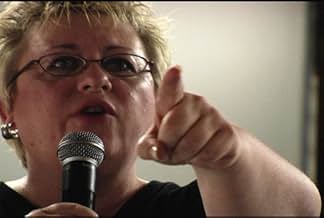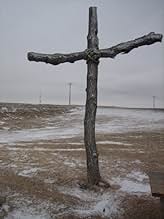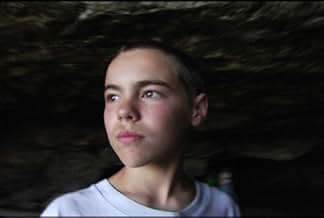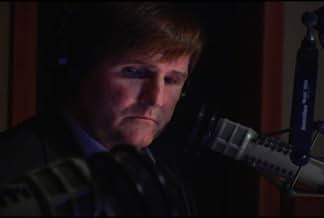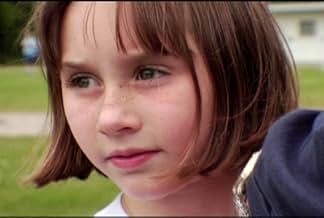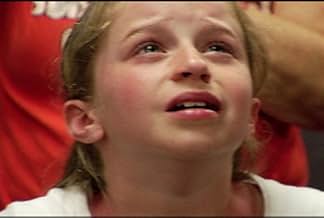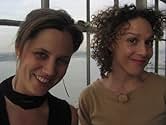CALIFICACIÓN DE IMDb
7.4/10
29 k
TU CALIFICACIÓN
Agrega una trama en tu idiomaA documentary on kids who attend a summer camp hoping to become the next Billy Graham.A documentary on kids who attend a summer camp hoping to become the next Billy Graham.A documentary on kids who attend a summer camp hoping to become the next Billy Graham.
- Nominado a 1 premio Óscar
- 6 premios ganados y 7 nominaciones en total
Opiniones destacadas
This documentary offers a rare chance to get a close view inside a not very well known society within our society. I thought the content was very honest, and - although this is not the kind of movie people watch for entertainment value - I would like to point out that this is also a very well made film, and certainly never dull or boring.
Religious communities are not often very open towards journalists or filmmakers; they fear - probably with good reason - that their portrayal by the secular media is biased and that their believes are depicted in the wrong light. However, in this documentary the filmmakers were granted full access, and the evangelical community whose portrayal you get to see in the film got the chance to see it first before it was released to the general public. They thought it was an accurate depiction of their lifestyle and their believes.
What you see in this film is not staged - this is real, 21th century footage. Highly recommended. 9 stars out of 10.
Favorite films: http://www.IMDb.com/list/mkjOKvqlSBs/
Lesser-known Masterpieces: http://www.imdb.com/list/ls070242495/
Favorite Low-Budget and B-Movies: http://www.imdb.com/list/ls054808375/
Favorite TV-Shows reviewed: http://www.imdb.com/list/ls075552387/
Religious communities are not often very open towards journalists or filmmakers; they fear - probably with good reason - that their portrayal by the secular media is biased and that their believes are depicted in the wrong light. However, in this documentary the filmmakers were granted full access, and the evangelical community whose portrayal you get to see in the film got the chance to see it first before it was released to the general public. They thought it was an accurate depiction of their lifestyle and their believes.
What you see in this film is not staged - this is real, 21th century footage. Highly recommended. 9 stars out of 10.
Favorite films: http://www.IMDb.com/list/mkjOKvqlSBs/
Lesser-known Masterpieces: http://www.imdb.com/list/ls070242495/
Favorite Low-Budget and B-Movies: http://www.imdb.com/list/ls054808375/
Favorite TV-Shows reviewed: http://www.imdb.com/list/ls075552387/
Enter the world of Jesus Camp, a brilliant documentary that chronicles the life of several people who attend or set up a "Jesus Camp" in (ironicaly) Devils Lake North Dakota.
Filmmakers Heidi Ewing, and Rachel Grady decide to focus mostly on the children that attend, with some focus on minister Becky Fisher who is one of the main architects of the camp.
Right away the filmmakers show a growing underlying change in the evangelical movement, to politicize their beliefs. Voice overs start talking about the newest supreme court nomination of Alito. However, once the focus starts on the kids who attend the camp the film gets its bearing.
What becomes obvious is that paranoia and fear is driven into the kids. There is Ashley a young girl, and Levi an older boy who seems to be on the quest to become a minister and preacher himself. It's obvious he likes the attention that is given him. But the kids are still kids, Levi and his friend go out into the woods and do what all kids do, explore find a scary spider, Levi even mentions, I like to throw rocks.
But then they are back in lessons again, scarred out of their boots in a sermon as they are being told to stay away from Harry Potter, abortion, and that they are essentially dirty from all the sins they carry. Most of them can't hold back the tears. Levi mentions he said he was saved when he was 5 years old (I can only think of the horrible things that he must have been guilty of to be converted (too much sugar cereal maybe?) ) The filmmakers do the smart thing and let the pictures and words speak for themselves. There is no voice over narration, no probing questions from the film-makers to the subjects themselves. There is no debate. The words from the kids just come out, and they are frightening. A sense of brainwashing can only be observed as the kids talk about how they have to fight in gods army, and that everyone else has to be 'purged'. Never mind that at one point kids are worshiping at a card board cut out of George Bush.
Some scenes literally look like they could have came from the movie "Triumph of the Will".
But the brilliance is shown in the innocence that these children loose and don't seem to enjoy in. What young kid needs to know about abortion? or be cleansed of all the horrors of the world? Why can't the kids just make up their own minds with everything but in front of them? When do kids ever get to just.... play? They are hints in the film at that, kids will be kids, little late night camp ghost stories, some break dancing.. it's all in good fun, and perfectly fine.
But it seems like Jesus camp just wants to crush their spirits.
Kudos to the film-makers for showing it real.
Filmmakers Heidi Ewing, and Rachel Grady decide to focus mostly on the children that attend, with some focus on minister Becky Fisher who is one of the main architects of the camp.
Right away the filmmakers show a growing underlying change in the evangelical movement, to politicize their beliefs. Voice overs start talking about the newest supreme court nomination of Alito. However, once the focus starts on the kids who attend the camp the film gets its bearing.
What becomes obvious is that paranoia and fear is driven into the kids. There is Ashley a young girl, and Levi an older boy who seems to be on the quest to become a minister and preacher himself. It's obvious he likes the attention that is given him. But the kids are still kids, Levi and his friend go out into the woods and do what all kids do, explore find a scary spider, Levi even mentions, I like to throw rocks.
But then they are back in lessons again, scarred out of their boots in a sermon as they are being told to stay away from Harry Potter, abortion, and that they are essentially dirty from all the sins they carry. Most of them can't hold back the tears. Levi mentions he said he was saved when he was 5 years old (I can only think of the horrible things that he must have been guilty of to be converted (too much sugar cereal maybe?) ) The filmmakers do the smart thing and let the pictures and words speak for themselves. There is no voice over narration, no probing questions from the film-makers to the subjects themselves. There is no debate. The words from the kids just come out, and they are frightening. A sense of brainwashing can only be observed as the kids talk about how they have to fight in gods army, and that everyone else has to be 'purged'. Never mind that at one point kids are worshiping at a card board cut out of George Bush.
Some scenes literally look like they could have came from the movie "Triumph of the Will".
But the brilliance is shown in the innocence that these children loose and don't seem to enjoy in. What young kid needs to know about abortion? or be cleansed of all the horrors of the world? Why can't the kids just make up their own minds with everything but in front of them? When do kids ever get to just.... play? They are hints in the film at that, kids will be kids, little late night camp ghost stories, some break dancing.. it's all in good fun, and perfectly fine.
But it seems like Jesus camp just wants to crush their spirits.
Kudos to the film-makers for showing it real.
I saw this film at the Silverdocs festival, expecting it to be little more than an oddball slice of Americana, but I was pleasantly surprised.
"Jesus Camp" revolves around a pentecostal minister who hosts a summer camp for children in North Dakota, and the sectarian Christian conservative families who send their children to this camp. Directors Heidi Ewing and Rachel Grady wisely chose to avoid the polemical tone of most politically-motivated films, and instead opt to present a mostly unfiltered glimpse of this odd subculture. But through carefully selected images and the use of talk radio commentary as a framing device, they construct a subtle, yet damning narrative about a religious movement that isolates its children from mainstream culture, indoctrinates them into right-wing causes, and uses them as political props.
At Jesus Camp, the daily activities include standard camp fare such as spelunking and go-karts, but they also include speaking in tongues and smashing coffee mugs emblazoned with the word "government". Children learn that "science doesn't prove anything," and learn to consider themselves part of an Army of God. They are compelled to pledge that they will fight to end abortion. They are even pushed into publicly confessing their impure thoughts, and many of them cry and wail charismatically.
The camp director explains that she admires the way Islamic cultures raise children so devoted they will risk their lives for their faith. When we ultimately see several of the campers being placed by their parents on the steps of the Capitol with tape over their mouths, protesting abortion, the real purpose of this camp is driven home.
But the most touching scenes are the ones where the children are alone, and we see the ways that this indoctrination creeps into the most innocent elements of childhood. 11 year old Tori loves dancing to Christian rock, but frets that it's not always easy to dance for God instead of "dancing for the flesh." On an outing to the bowling alley, 9 year old Rachael feels compelled to walk up to strangers and awkwardly evangelize to them, without being prompted. A roomful of boys telling ghost stories after dark are interrupted by an adult who warns them about stories that don't glorify God.
No doubt some viewers will accuse the filmmakers of the dreaded liberal bias. But this is not a work of fiction, nor is it slanted reporting. These are real people and real events, captured on film. If the evangelical movement comes off badly in this film, the people on screen have no one but themselves to blame.
"Jesus Camp" revolves around a pentecostal minister who hosts a summer camp for children in North Dakota, and the sectarian Christian conservative families who send their children to this camp. Directors Heidi Ewing and Rachel Grady wisely chose to avoid the polemical tone of most politically-motivated films, and instead opt to present a mostly unfiltered glimpse of this odd subculture. But through carefully selected images and the use of talk radio commentary as a framing device, they construct a subtle, yet damning narrative about a religious movement that isolates its children from mainstream culture, indoctrinates them into right-wing causes, and uses them as political props.
At Jesus Camp, the daily activities include standard camp fare such as spelunking and go-karts, but they also include speaking in tongues and smashing coffee mugs emblazoned with the word "government". Children learn that "science doesn't prove anything," and learn to consider themselves part of an Army of God. They are compelled to pledge that they will fight to end abortion. They are even pushed into publicly confessing their impure thoughts, and many of them cry and wail charismatically.
The camp director explains that she admires the way Islamic cultures raise children so devoted they will risk their lives for their faith. When we ultimately see several of the campers being placed by their parents on the steps of the Capitol with tape over their mouths, protesting abortion, the real purpose of this camp is driven home.
But the most touching scenes are the ones where the children are alone, and we see the ways that this indoctrination creeps into the most innocent elements of childhood. 11 year old Tori loves dancing to Christian rock, but frets that it's not always easy to dance for God instead of "dancing for the flesh." On an outing to the bowling alley, 9 year old Rachael feels compelled to walk up to strangers and awkwardly evangelize to them, without being prompted. A roomful of boys telling ghost stories after dark are interrupted by an adult who warns them about stories that don't glorify God.
No doubt some viewers will accuse the filmmakers of the dreaded liberal bias. But this is not a work of fiction, nor is it slanted reporting. These are real people and real events, captured on film. If the evangelical movement comes off badly in this film, the people on screen have no one but themselves to blame.
As a man of religion I don't want to be too critical of the Evangelicals in this documentary, but man! It's hard to watch these kids being drilled on adult issues in a very cult-like way and not feel a certain type of way about it. All parents are going to instill some form of beliefs, ethics, morals, or principles into their children, that's part of being a parent. You have to teach them to be good and upstanding before releasing them upon society. And sure, every parent may go about that teaching process in a different way, but watching "Jesus Camp" I couldn't help but be bothered. These kids aren't old enough to even think about sex, yet they're being lectured about abortion. Not once did I hear anything about being truthful, honest, kind, or generous. I just heard, "Love Jesus." "Pray for this, pray for that, and don't sin." "Jesus Camp" is scary and not for the reasons the camp-goers would think.
I saw this film at SilverDocs, a documentary film festival at the American Film Institute in Silver Spring. It's excellent, and I highly recommend it.
The basic storyline follows a year in the lives of three children from evangelical Christian families in Missouri, and focuses considerably on their experience at an evangelical summer camp ("Kids on Fire" in Devil's Lake, ND). The kids, 12-year-old Levi, 10-year-old Tory, and 9-year-old Rachel are, of course, endearing in their cuteness, but frightening in their fervor. Levi thinks that he will become a pastor, and his preaching to kids is starkly reminiscent of the Bible thumpers of Sunday morning TV. At camp, Tory is shown several times with tears streaming down her face, not least when a pro-life leader comes and distributes miniature plastic fetuses to illustrate the evil of abortion and again when many kids at camp begin speaking in tongues. Rachel, a nine-year-old evangelist, walks up to perfect strangers to ask them if they believe they're going to heaven and whether they would like to talk about Jesus. In short, the kids are the perfect spokespeople for the Jesus movement.
The documentary goes beyond their experiences at camp and paints a vivid image of the evangelical subculture in middle America. From scenes with a mother home schooling her son on the lunacy of evolution to kids at camp praying fervently for a cardboard cutout of George W Bush, the tenacious beliefs of the subjects and their utter lack of doubt is striking. The infusion of politics into religion is also notable, as the children are told of the evils of homosexuality, that prayer in school is necessary for schools to teach effectively, and that America is responsible for the deaths of fifty million innocent children since 1973. The families even travel to Washington to protest in front of the Supreme Court building.
The most awkward parts of the movie were scenes with Mike Papantonio, an Air America radio host. I felt the scenes involving him seemed a little forced, although a conversation at the end between the charismatic camp director, Becky Fischer, and Papantonio was an interesting microcosm of the larger political debate in this country. Interestingly, during a film festival question and answer session with the producers (Heidi Ewing and Rachel Grady), they indicated that Papantonio was a late addition to the film because without him, there was no conflict. The people in the film were so sure of their beliefs that nothing in the movie showed them wavering. I wonder if the film might not have been stronger if they had left that sense of certainty alone.
Ewing and Grady also chose to use the nomination of Samuel Alito to the Supreme Court as a thread to tie the film together. Unfortunately, none of the subjects of the documentary spent much time talking directly about the Supreme Court. They talked about some of the issues that the Supreme Court might deal with, but the nomination of judges didn't seem to be a big factor in their lives. There were a few scenes in which radio announcers and guest speakers at the camp encouraged the families to pray for the nomination of judges who agree with evangelical Christians, but I didn't think that there was enough to hold that particular thread together.
During the question and answer session, Ewing and Grady indicated that while they were both fairly secular, big city Democrats, they honestly liked the people in the documentary. In their view, the people in the documentary followed the law, and they worked to make the country better as they saw it, so what's wrong with that? They expressed interest in making a follow-up movie in five years to see whether the kids' faith survives puberty. It would certainly be an interesting experiment. They indicated that Fischer and the families that were profiled had seen the final project and thought that it was a fair representation of their lives. Fischer even thought that she could use it as an evangelical tool! At the same time, the audience I saw it with was overwhelmingly liberal and they also reacted positively (and, I'll say, with a fair degree of shock). To me, that says that Ewing and Grady did a nice job of ensuring that their biases did not show through into the movie, leaving audiences to read into it as they choose.
In sum, Jesus Camp is a movie that is worth watching. If you get a chance, see this film!
The basic storyline follows a year in the lives of three children from evangelical Christian families in Missouri, and focuses considerably on their experience at an evangelical summer camp ("Kids on Fire" in Devil's Lake, ND). The kids, 12-year-old Levi, 10-year-old Tory, and 9-year-old Rachel are, of course, endearing in their cuteness, but frightening in their fervor. Levi thinks that he will become a pastor, and his preaching to kids is starkly reminiscent of the Bible thumpers of Sunday morning TV. At camp, Tory is shown several times with tears streaming down her face, not least when a pro-life leader comes and distributes miniature plastic fetuses to illustrate the evil of abortion and again when many kids at camp begin speaking in tongues. Rachel, a nine-year-old evangelist, walks up to perfect strangers to ask them if they believe they're going to heaven and whether they would like to talk about Jesus. In short, the kids are the perfect spokespeople for the Jesus movement.
The documentary goes beyond their experiences at camp and paints a vivid image of the evangelical subculture in middle America. From scenes with a mother home schooling her son on the lunacy of evolution to kids at camp praying fervently for a cardboard cutout of George W Bush, the tenacious beliefs of the subjects and their utter lack of doubt is striking. The infusion of politics into religion is also notable, as the children are told of the evils of homosexuality, that prayer in school is necessary for schools to teach effectively, and that America is responsible for the deaths of fifty million innocent children since 1973. The families even travel to Washington to protest in front of the Supreme Court building.
The most awkward parts of the movie were scenes with Mike Papantonio, an Air America radio host. I felt the scenes involving him seemed a little forced, although a conversation at the end between the charismatic camp director, Becky Fischer, and Papantonio was an interesting microcosm of the larger political debate in this country. Interestingly, during a film festival question and answer session with the producers (Heidi Ewing and Rachel Grady), they indicated that Papantonio was a late addition to the film because without him, there was no conflict. The people in the film were so sure of their beliefs that nothing in the movie showed them wavering. I wonder if the film might not have been stronger if they had left that sense of certainty alone.
Ewing and Grady also chose to use the nomination of Samuel Alito to the Supreme Court as a thread to tie the film together. Unfortunately, none of the subjects of the documentary spent much time talking directly about the Supreme Court. They talked about some of the issues that the Supreme Court might deal with, but the nomination of judges didn't seem to be a big factor in their lives. There were a few scenes in which radio announcers and guest speakers at the camp encouraged the families to pray for the nomination of judges who agree with evangelical Christians, but I didn't think that there was enough to hold that particular thread together.
During the question and answer session, Ewing and Grady indicated that while they were both fairly secular, big city Democrats, they honestly liked the people in the documentary. In their view, the people in the documentary followed the law, and they worked to make the country better as they saw it, so what's wrong with that? They expressed interest in making a follow-up movie in five years to see whether the kids' faith survives puberty. It would certainly be an interesting experiment. They indicated that Fischer and the families that were profiled had seen the final project and thought that it was a fair representation of their lives. Fischer even thought that she could use it as an evangelical tool! At the same time, the audience I saw it with was overwhelmingly liberal and they also reacted positively (and, I'll say, with a fair degree of shock). To me, that says that Ewing and Grady did a nice job of ensuring that their biases did not show through into the movie, leaving audiences to read into it as they choose.
In sum, Jesus Camp is a movie that is worth watching. If you get a chance, see this film!
¿Sabías que…?
- TriviaSince the making of the film, Becky Fischer, children's pastor for Kids on Fire, announced that due to negative reactions to the camp after the film, including telephone calls and vandalism, the camp, which was held once a year for three weeks, has been discontinued indefinitely and will be replaced by other events.
- Citas
Rachel: [preaching to a group of guys sitting in a park] If you were to die right now in this moment, where do you think you'd go?
guy in the park: Heaven
Rachel: [subdued] Really?
guy in the park: Yeah. Sure.
Rachel: Oh... okay. Have a nice day!
[runs back to her friends]
Rachel: I think they were Muslims!
- Bandas sonorasBreathe Prophesy
Music and lyrics by Todd Ganovski
Selecciones populares
Inicia sesión para calificar y agrega a la lista de videos para obtener recomendaciones personalizadas
- How long is Jesus Camp?Con tecnología de Alexa
Detalles
Taquilla
- Total en EE. UU. y Canadá
- USD 902,544
- Fin de semana de estreno en EE. UU. y Canadá
- USD 17,659
- 17 sep 2006
- Total a nivel mundial
- USD 1,013,596
Contribuir a esta página
Sugiere una edición o agrega el contenido que falta

Principales brechas de datos
What is the Spanish language plot outline for Jesus Camp (2006)?
Responda

